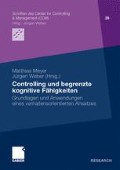Zusammenfassung
Learning-Classifier-Systeme (LCS) sind in der jüngeren Zeit sehr populär geworden. Das kann auch im Bereich der sozialwissenschaftlichen Simulation beobachtet werden. Insbesondere werden sie in diesem Gebiet gerne dazu verwendet, kognitive Prozesse darzustellen und Lernen zu modellieren. Exemplarische Beispiele der Anwendung von LCS in sozialwissenschaftlichen Simulationsmodellen sind Marengo (1992), der ein Holland-Classifier-System verwendet, um das Lernen von Agenten im Rahmen der Lösung eines kollektiven Entscheidungsproblems in einer Organisation zu modellieren, Vriend (1995), der die Selbstorganisation auf Märkten untersucht oder Welch/Reeves/Welch (1998), deren Modell das Entscheidungsverhalten von Wirtschaftsprüfern ebenfalls auf Basis eines LCS simuliert.
Dieser Beitrag basiert auf Meyer/Hufschlag (2006). Er hat zudem von vielen Diskussionen mit Bernd-Oliver Heine profitiert. Dank gilt zudem den Konferenzteilnehmern der European Social Simulation Association (ESSA) 2005 in Koblenz für hilfreiche Anregungen.
Access this chapter
Tax calculation will be finalised at checkout
Purchases are for personal use only
Preview
Unable to display preview. Download preview PDF.
Literaturverzeichnis
Bull, L. (2004): Learning Classifier Systems: A Brief Introduction. In: Bull, L. (Hrsg.): Applications of Learning Classifier Systems. Berlin u.a., S. 3–14.
Butz, M./Wilson, S. W. (2002): An Algorithmic Description of XCS. In: Soft Computing, 6. Jg., S. 144–153.
Chang, M.-H./Harrington, J. E. (2007): Agent-Based Models of Organizations. In: Judd, K. L./Tesfatsion, L. (Hrsg.): Agent-Based Models of Organisations: Handbook of Computational Economics II. Amsterdam et al., S. 1273–1337.
Chattoe, E. (1998): Just How (Un)realistic are Evolutionary Algorithms as Representations of Social Processes?, In: Journal of Artificial Societies and Social Simulation, 1. Jg.
Crowther-Heyck, H. (2005): Herbert A. Simon: The Bounds of Reason in Modern America. Baltimore.
Epstein, J. M./Axtell, R. (1996): Growing Artificial Societies: Social Science from the Bottom up. Washington, DC.
Heine, B.-O. (2008): Konzeptionelle Nutzung von Controllinginformationen: Ein modelltheoretischer Ansatz. Wiesbaden.
Holland, J. H. (1992): Genetic Algorithms. In: Scientific American, 267. Jg., S. 44–50.
Holland, J. H./Holyoak, K. J./Nisbett, R. E./Thagard, P. R. (1987): Induction: Processes of Inference, Learning, and Discovery. Cambridge, Mass.
Hufschlag, K. (2008): Informationsversorgung lernender Akteure. Wiesbaden.
Janßen, H./Bundschuh, M. (1993): Objektorientierte Software-Entwicklung. München, Wien.
Koza, J. R./Rice, J. P./Roughgarden, J. (1992): Evolution of Food Foraging Strategies for the Caribbean Anolis Lizard Using Genetic Programming, Santa Fe Institute Working Paper 92-06-028, Santa Fe, NM.
Lindenberg, S. (1992): The Method of Decreasing Abstraction. In: Coleman, J. S./Fararo, T. J. (Hrsg.): Rational Choice Theory: Advocacy and Critique. Newsbury Park, S. 3–20.
Marengo, L. (1992): Coordination and Organizational Learning in the Firm. In: Journal of Evolutionary Economics, 2. Jg., S. 313–326.
Marschak, J./Radner, R. (1972): Economic Theory of Teams. New Haven, London.
Meyer, M./Hufschlag, K. (2006): A Generic Approach to an Object-Oriented Learning Classifier System Library. In: Journal of Artificial Societies and Social Simulation, 9. Jg.
Meyer, M./Heine, B.-O. (2009): Das Potenzial agentenbasierter Simulationsmodelle – Aufgezeigt im Anwendungsfeld „Computational Organization Theory“. In: Die Betriebswirtschaft, 69. Jg., S. 495–520.
Meyer, M./Lorscheid, I./Troitzsch, KG. (2009): The Development of Social Simulation as Reflected in the First Ten Years of JASSS: A Citation and Co-citation Analysis, Journal of Artificial Societies and Social Simulation, 12. Jg.
Meyer, D./Karatzoglou, A./Leisch, F./Buchta, C./Hornik, K. (2003): A Simulation Framework for Heterogenous Agents. In: Computational Economics, 22. Jg., S. 285–301.
North, M. J./Collier, N. T./Vos, J. R. (2006): Experiences Creating Three Implementations of the Repast Agent Modeling Toolkit. In: ACM Transactions on Modeling and Computer Simulation, 16. Jg., S. 1–25.
Ostrom, T. M. (1988): Computer Simulation: The Third Symbol System. In: Journal of Experimental Social Psychology, 24. Jg., S. 381–392.
Polhill, J. G./Edmonds, B. (2007): Open Access for Social Simulation. In: Journal of Artificial Societies and Social Simulation, 10. Jg.
Radner, R. (2000): Costly and Bounded Rationality in Individual and Team Decision-Making. In: Industrial and Corporate Change, 9. Jg., S. 623–658.
Vriend, N. J. (1995): Self-Organization of Markets: An Example of a Computational Approach. In: Computational Economics, 8. Jg., S. 205–231.
Welch, O. J./Reeves, T. E./Welch, S. T. (1998): Using a Genetic Algorithm-Based Classifier System for Modeling Auditor Decision Behavior in a Fraud Setting, Intelligent Systems in Accounting. In: Finance & Management, 7. Jg., S. 173–186.
Wilson, S. W. (1994): ZCS: A Zeroth Level Classifier System. In: Evolutionary Computation, 2. Jg., S. 1–18.
Author information
Authors and Affiliations
Editor information
Editors and Affiliations
Rights and permissions
Copyright information
© 2011 Gabler Verlag | Springer Fachmedien Wiesbaden GmbH
About this chapter
Cite this chapter
Meyer, M., Hufschlag, K. (2011). Eine generische Learning-Classifier-Bibliothek auf Basis objektorientierter Prinzipien: Grundlagen einer Umsetzung der Methode der abnehmenden Abstraktion „in silicio“. In: Meyer, M., Weber, J. (eds) Controlling und begrenzte kognitive Fähigkeiten. Gabler. https://doi.org/10.1007/978-3-8349-6398-7_6
Download citation
DOI: https://doi.org/10.1007/978-3-8349-6398-7_6
Publisher Name: Gabler
Print ISBN: 978-3-8349-2309-7
Online ISBN: 978-3-8349-6398-7
eBook Packages: Business and Economics (German Language)

